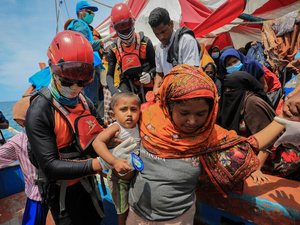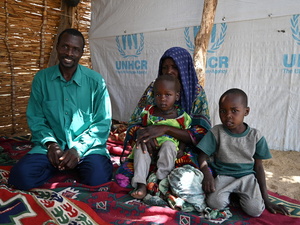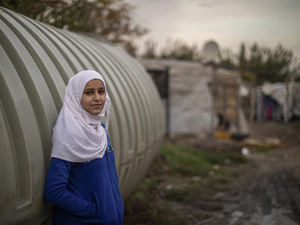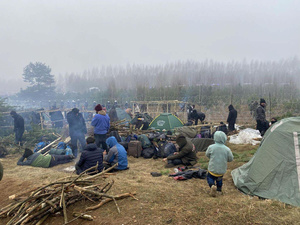‘If COVID-19 arrives in the camp, it will be devastating’

‘If COVID-19 arrives in the camp, it will be devastating’
Since 9 April, almost 860,000 Rohingya refugees in Bangladesh’s Cox’s Bazar District have been living under a complete lockdown imposed by the government to halt the spread of the coronavirus. Only critical activities are allowed to continue inside the camps.
The disease could spread quickly through settlements where over 40,000 people are crammed into each square kilometre – more than 40 times the average population density for Bangladesh. An internet ban in place since September 2019 has made it difficult to communicate reliable information about the virus.
Saidul Hoque was born in one of the camps in Cox’s Bazar in 1996, five years after his family fled Myanmar. He now lives in Kutupalong – the world’s largest refugee settlement. He dreams of one day becoming a journalist and co-founded the Rohingya Film School with some other refugees earlier this year to train Rohingya youth in photography and videography. Now they are using their skills to make videos in the Rohingya language about how refugees can protect themselves from the virus.
We talked to him about how life in the settlements has changed since the lockdown started and what needs to be done to raise further awareness about the pandemic.
Before the coronavirus, the streets of the camp were filled with people. They went from home to home and gathered in the market. Children gathered at the football fields in the evenings. Our mosques were full of people.
But since the lockdown was declared, everything changed. Now only a few people go to mosque. Many shops and markets in the camp have been closed and the streets are empty. People go out only if they need something urgent.
The Rohingya buy their food every day – we don’t have enough capacity to store food for the future. But because of the lockdown, we can’t go to the market to buy our necessary things and people have been facing difficulties meeting their daily needs, especially for vegetables and fish. Day by day it will be more difficult.
After the lockdown was declared, we also couldn’t move to different places to do awareness campaigns because no vehicles are allowed on the roads.
I spoke to some refugees in the last few days and they are afraid of COVID-19. If it arrives in the camp, it will be devastating. So that’s why they are not leaving the house – due to fear.
We all know everyone is facing difficulties due to the COVID-19 pandemic, even European countries with their strong economies and advanced treatment facilities. So just imagine what will happen if the virus comes to the world’s largest and most congested refugee camp?
“Everyone is asking us to maintain social distance, but how can we?”
We live in very small houses with too many people. Seven members of my family are sharing an eight by 10-foot shelter. Everyone is asking us to maintain social distance, but how we can? It’s totally impossible for us.
To prevent the coronavirus, we all need to wash our hands frequently, but we don’t have enough toilets and wash facilities. We don’t even have enough water to meet our basic needs.
We are all totally dependent on NGOs and the Bangladesh government because we are not able to protect ourselves from this virus. INGOs and NGOs are working closely with the government to prevent coronavirus in the camps.
They have done some awareness and door-to-door campaigns. They have put up posters and distributed leaflets in the Bengali and Burmese languages. Some information was spread through loudspeakers.
However, it’s not enough for all the Rohingya refugees. Many rumours are going around inside the camps and far too few people have the proper information. We need to work together with Imams and [community] leaders, because our people listen to and respect them.
NGOs and we ourselves are making awareness videos, but because of the internet ban, our messages are not reaching them.
The internet is something like a door-to-door campaign – people can get information from their homes; they can understand what they should or should not do.
But the last few months we have been separated from the world and our people are not getting enough information about the coronavirus.
We are recording and documenting camp news and making some informative videos on the coronavirus in the Rohingya language and trying to upload them to social media, but our team is facing a big problem without internet.












